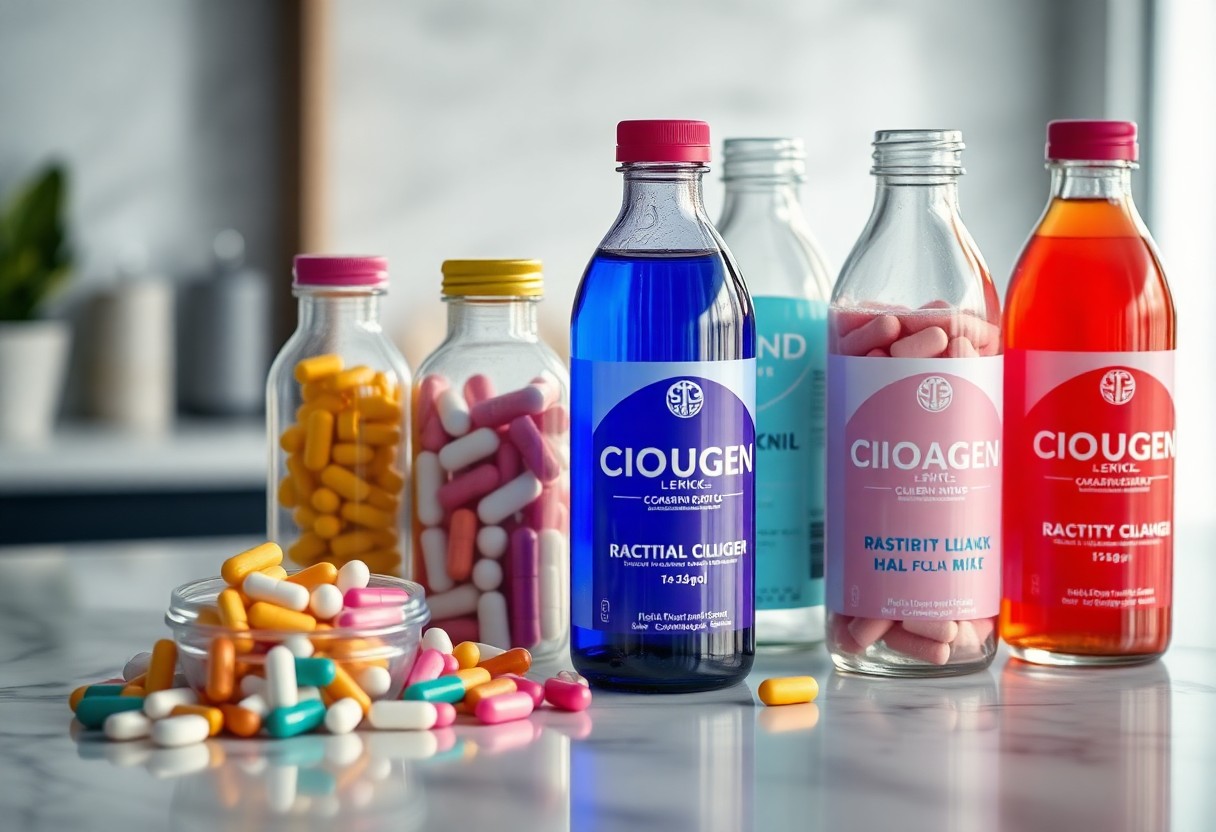You may be intrigued by the growing popularity of collagen drinks and supplements for enhancing your skin, hair, and nails. As you consider incorporating these products into your regimen, understanding the science behind their effectiveness can help you make an informed decision. While collagen is a key structural protein in your body, research on its supplementation remains varied. This article will investigate into whether these products are truly beneficial for your beauty and wellness goals.
What is Collagen?
Before exploring the benefits of collagen supplements, it’s imperative to understand what collagen is. Collagen is a key structural protein in your body, found in your skin, hair, nails, tendons, cartilage, and bones. It works together with substances like hyaluronic acid and elastin to maintain the elasticity and moisture in your skin. As you age or experience sun damage, your body’s natural collagen production decreases, which can impact your skin’s firmness and hydration. You can support collagen production by consuming protein-rich foods, including those that naturally provide this important protein.

The Science Behind Collagen Supplements
A growing body of research examines the potential benefits of collagen supplements, especially for skin, hair, and nails. Studies suggest that while these products may offer some advantages, the evidence is not conclusive. Many trials combine collagen with other beneficial ingredients, complicating the ability to isolate their individual effects. More extensive, high-quality clinical trials are needed to better understand the impact of collagen supplementation on overall skin and hair health.
Impact on Skin Health
At this time, evidence supports the idea that collagen may improve skin moisture, elasticity, and reduce wrinkles. A review of 19 studies indicates that participants using collagen supplements experienced notable improvements in skin firmness and appearance. However, due to varying formulations, it’s unclear how much of this benefit is solely attributed to collagen.
Effects on Hair and Nails
Below the surface, the impact of collagen on hair and nails remains less understood. A small study indicated that participants with brittle nails experienced improvements when taking daily collagen for 24 weeks. Yet, there is a lack of robust clinical evidence to support claims about collagen effectively enhancing hair growth or quality.
Science has yet to provide comprehensive evidence that collagen supplementation can significantly improve hair health or stimulate growth. While some anecdotal reports suggest benefits, no substantial clinical data exists to validate these claims. The sole study examining nails showed some improvement, but its limitations restrict the conclusiveness of these findings. If you’re considering collagen for your nails or hair, it’s good to approach these claims with caution and consult healthcare professionals for personalized advice.
Evaluating the Evidence
Clearly, there is a significant amount of interest in the benefits of collagen supplements for skin, hair, and nails. While some studies suggest positive outcomes, the consistency and clarity of these findings warrant careful examination. It’s imperative for you to understand the current evidence as you consider whether these products are a worthwhile addition to your health regimen.
Review of Studies
At present, a review of 19 studies analyzing the effects of collagen supplementation revealed improvements in skin moisture and elasticity among participants. However, many of these trials included additional ingredients like vitamins and minerals, making it challenging to attribute benefits solely to collagen.
Limitations of Current Research
To fully assess the potential advantages of collagen drinks and supplements, it’s important to acknowledge the limitations in current research. Many studies lack robust control groups, and small sample sizes make it difficult to generalize results.
Indeed, the existing studies on collagen often include confounding variables like other beneficial ingredients, raising questions about the specific effects attributed to collagen. Moreover, comprehensive trials with larger populations are needed to substantiate claims of effectiveness. Until such studies are conducted, you may want to approach collagen supplements with cautious optimism while focusing on established skincare routines and a balanced diet.

Recommendations for Collagen Use
Despite the enthusiasm surrounding collagen drinks and supplements, it is crucial to approach them with caution. Large-scale studies confirming their long-term benefits for skin, hair, and nails are still lacking. If you decide to incorporate collagen into your routine, look for products with minimal additives and high levels of specific peptides known to enhance skin moisture and elasticity. Always consult your doctor before introducing any new supplements, especially if you have existing health concerns.
Considerations Before Trying Supplements
One key consideration is that your body may not effectively absorb collagen in its whole form. It’s important to ensure that the collagen you choose is broken down into peptides, which can potentially help improve your skin, hair, and nails. If you have conditions such as gout or need to regulate protein intake, discussing your collagen use with a healthcare provider is wise.
Alternative Approaches to Improve Skin and Hair Health
Collagen isn’t the only option for enhancing your skin and hair health. You can focus on lifestyle changes and topical treatments to achieve a vibrant appearance. Prioritizing a balanced diet rich in protein, staying hydrated, and using sunscreen daily can significantly benefit your skin’s elasticity and moisture levels. Additionally, topical retinoids and antioxidants can effectively minimize the appearance of wrinkles and enhance overall skin texture without relying solely on supplements.
Further exploring non-supplement options can provide you with a more comprehensive approach to skincare. Incorporating foods high in vitamin C and omega-3 fatty acids will support your body’s natural collagen production. Regularly applying quality moisturizers and engaging in a consistent skincare routine can also make a notable difference. Don’t forget to manage environmental factors, such as sun exposure and smoking, as they can substantially impact your skin and hair health over time.
Lifestyle Factors Affecting Collagen Production
Now, it’s vital to understand how your lifestyle choices can influence your body’s collagen production. Factors such as smoking, excessive alcohol consumption, and sun exposure can significantly decrease collagen synthesis. To support your body’s natural collagen levels, consider the following:
- Maintain a balanced diet rich in protein and vitamins.
- Stay hydrated and apply sunscreen daily.
- Limit tobacco use and alcohol intake.
- Engage in regular physical activity.
Recognizing these lifestyle factors can help you make informed choices that may positively impact your collagen production.
Consulting Healthcare Professionals
Many people consider taking collagen supplements, but it’s crucial to consult your healthcare professional before starting any new regimen. Your doctor can help assess if these products are suitable for your specific needs, especially if you have underlying conditions like gout or dietary restrictions. While some studies suggest benefits for skin moisture and elasticity, the evidence surrounding the effectiveness of collagen for hair and nails is limited. An informed decision will ensure that you prioritize your overall health.
Final Words
Hence, if you’re considering pills and collagen drinks as a way to enhance your skin, hair, and nails, it’s necessary to approach with caution. While some studies suggest potential benefits, the evidence is still limited, especially for hair and nails. Focus on maintaining a balanced diet and a healthy lifestyle for overall well-being. Consulting with a healthcare professional can provide personalized advice to help you explore your options effectively.


